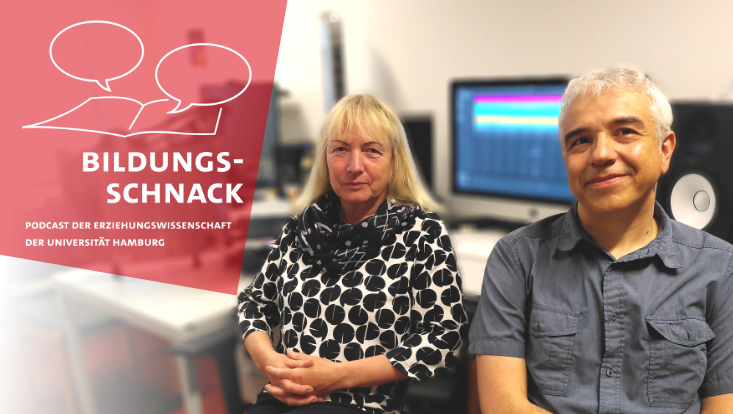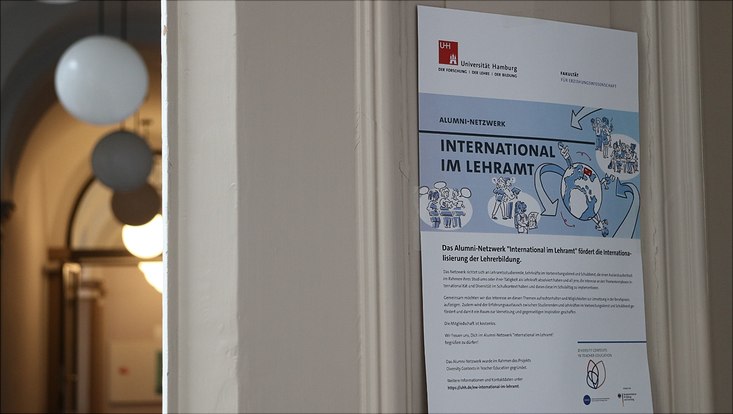An Anti-Bias Approach to Diversity Contexts
5 August 2022

Photo: @Bildungsschnack
In the July episode of the Podcast Bildungsschnack, produced by the Faculty of Education at Universität Hamburg, Prof. Dr. MHEd Telse Iwers and Dr. Javier Carnicer talk about the DiCoT (Diversity Contexts in Education) project and their ancillary research.
This is a summary of the conversation in English and may be used only in agreement with the author (Faculty of Education at Universität Hamburg). Listen to the episode (in German).
Key words: diversity, introductory internship, anti-bias approach
Moderation: Dr. Katrin Steinvoord
Introduction
Welcome to our new episode of Bildungsschnack. As we do every month, today we are also taking a closer look at an exciting research project in the Faculty of Education at Universität Hamburg.
In the seventh episode, I welcome our guests Prof. Dr. MHEd Telse Iwers and Dr. Javier Carnicer (summary of conversation):
Principles of DiCoT
In this episode, our guests tell us about the DiCoT project (Diversity Contexts in Teacher Education) and their ancillary research. DiCoT is funded by the DAAD within the context of its Lehramt International—Modellprojekte an Universitäten funding line. The project runs from the beginning of 2021 to the end of 2024 and is being conducted jointly with the Hamburg Center for Teacher Education (ZLH). The goal of the project is to combine international experience and the bachelor stage of teaching training. International experience can take place in the form of an internship abroad or via reflection upon international experience “at home.” Within the scope of DiCoT, students learn about anti-bias approaches, among other things, in their teaching practice period (Referendariat) and complementary seminar for the introductory internship. Equipped with theoretical principles (anti-bias approach in their teacher practice period), the students go abroad, learn, “attend” a complementary seminar offered in the form of an e-portfolio that they must complete, and then reflect on their experiences at a concluding event. All teachers for the teaching practice period have been schooled in anti-bias training, enabling them to design their respective practical components of the seminar.
The anti-bias approach
“Bias” involves partiality and prejudice, as well as incongruities, one-sidedness, and distortion. Thus, “anti-bias” means rectifying such incongruities and prejudices. It is not just about working on your own prejudices and stereotypes but also on the societal conditions that lead to them. The anti-bias approach aims to empower individuals as well as to dismantle discrimination. DiCoT uses this approach because it prepares students for diversity contexts very effectively. These kinds of diversity contexts can be found in Hamburg, Germany, as well as abroad. DiCoT is a project in which diversity is conceived of as intersectionality and in which various types of differences are addressed. Using an anti-bias approach means reflecting throughout the teaching practice period of the introductory internship on all categories of difference (e.g., ethnic background, socioeconomic status, family’s educational background, siblings within the family group, rural vs. urban, etc.). These various aspects constitute the identity that forms the basis for reflection upon diversity.
Project participants
There are 3 groups taking part in the DiCoT project.
- The ELF Team (Erziehungswissenschaftlich Lehre und Forschung) includes, in addition to Telse and Javier, Prof. Dr. Sara Fürstenau, Dr. des Simone Plöger, Carolina Colmenares Díaz, and Helena Dedecek Gertz.
- The e-portfolio is being designed by Britta Schmidt and Nadja Strunk. (This has essentially been completed).
- Myriam Hummel and Elisa Imanuwarta are the coordinators. They are creating an internal project alumni network and partner network as well as pursuing networking generally.
Ancillary research: implementation and experience
Generally, research focuses on the module focusing on the anti-bias approach as part of the introductory internship. There are 2 lines of research: First, the implementation of the module is being looked at critically. Second, the students and their experiences are looked at for clues to possible changes in attitudes to see to what extent the module actually imparts the objectives of anti-bias training.
Researchers take a process- and dialog-oriented approach to the implementation. Above all, this involves extensive communication between the ELF Team and the teachers for the teaching practice period seminars. They reflect upon how the teachers experienced their anti-bias training and look at which parts of the material the teachers ultimately used and how they did so. For example, participatory observation helped with the identification of differences in the use of exercises and materials.
The second focus is on changes in the students’ subjective attitudes. Students keep “reflective journals” during their stays abroad and/or throughout their experiences and there are subsequent interviews on the basis of these journals. Researchers are interested here above all in whether stereotypes are dismantled or if new stereotypes arise. It is thus vital that students also reflect upon their own norms, values, and normative positions.
Researchers’ personal motivations
Javier Carnicer is primarily motivated by the internationalization of teacher training and the support for students as they reflect upon diversity contexts. Telse Iwers is strongly motivated by the desire to create equal opportunity in the classroom (by training future teachers, e.g., with the anti-bias approach). She also places great value on thinking about and removing cognitive learning obstacles.
Research project challenges
The theoretical scope and the theoretical goal of the anti-bias approach are limited. In Telse Iwers’ opinion, it is useful as preparation, e.g., for the introductory internship; it “does not contribute, in its theoretical nature, to comprehensive reflection upon diversity categories.” In the future, it requires greater theoretical scope that is not too complex but that supplements the rather more practice-oriented anti-bias approach.
Teachers at the university are very experienced in leading theory-based reflection. DiCoT is a project, however, that is very different in its approach. Personal reflection, above all upon one’s own personal experiences of diversity, is new for many and takes some getting used to. Designing these processes such that all participants benefit is the biggest challenge for Javier Carnicer.
The future of DiCoT
In the future, ALL students should be encouraged to have and reflect deeply upon experiences abroad during their studies. DiCoT is intended as a cornerstone and in the future, students should also incorporate their own locations. With a view to continuing, DiCoT should give teachers the option of integrating opportunities for reflection into their seminars. As many teachers and students as possible should reflect on difference and inequality in their seminars.
Outro
This was an episode of Bildungsschnack. Every month, the series introduces a research project in the Faculty of Education at Universität Hamburg. If you would like to know which topics our researchers are working on, what they do, and how it is relevant to education and society, just subscribe on Spotify or iTunes or see our Bildungsschnack webpage (in German only).
Thank you for listening! Good-bye and see you next time!


